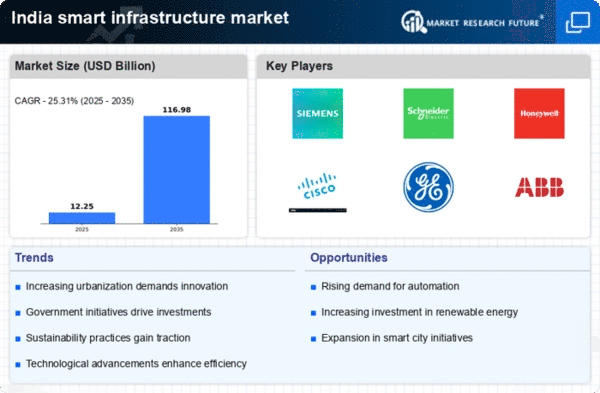Public-Private Partnerships (PPPs)
Public-Private Partnerships (PPPs) are emerging as a vital mechanism for financing smart infrastructure projects in India. These collaborations enable the sharing of resources, risks, and expertise between the public and private sectors, facilitating the development of large-scale infrastructure projects. The government has recognized the potential of PPPs in enhancing service delivery and infrastructure quality. Recent initiatives indicate that around 30% of infrastructure projects are now being executed through PPP models. This trend is likely to bolster the smart infrastructure market, as private investments are crucial for meeting the growing demand for advanced infrastructure solutions.
Urbanization and Population Growth
The rapid urbanization in India is a primary driver for the smart infrastructure market. As urban populations continue to swell, the demand for efficient infrastructure solutions intensifies. By 2031, it is projected that over 600 million people will reside in urban areas, necessitating advanced infrastructure to support this growth. Smart infrastructure can enhance urban living by integrating technology into transportation, energy, and waste management systems. This integration is expected to improve service delivery and reduce operational costs. The smart infrastructure market is likely to see substantial investments, with estimates suggesting a growth rate of around 15% annually, driven by the need for sustainable urban development.
Investment in Renewable Energy Sources
The increasing focus on renewable energy sources is a crucial driver for the smart infrastructure market. India aims to achieve 500 GW of renewable energy capacity by 2030, which necessitates the development of smart grids and energy management systems. These systems facilitate the integration of renewable energy into the existing infrastructure, enhancing efficiency and reliability. The smart infrastructure market is expected to benefit from investments in solar, wind, and other renewable technologies, with funding projected to exceed $20 billion in the coming years. This shift towards sustainable energy solutions aligns with global trends and supports India's commitment to reducing carbon emissions.
Rising Demand for Smart Mobility Solutions
The increasing demand for smart mobility solutions is a significant driver for the smart infrastructure market. With urban congestion becoming a pressing issue, cities are seeking innovative transportation solutions that enhance connectivity and reduce travel times. Smart mobility encompasses various technologies, including intelligent transportation systems, electric vehicles, and integrated public transport solutions. The market for smart mobility in India is projected to grow at a CAGR of 18% over the next five years, driven by government initiatives and consumer preferences for sustainable transport options. This shift is likely to transform urban mobility and contribute to the overall growth of the smart infrastructure market.
Technological Advancements in Construction
Technological innovations in construction methods and materials are significantly influencing the smart infrastructure market. The adoption of Building Information Modeling (BIM), 3D printing, and modular construction techniques is transforming how infrastructure projects are designed and executed. These advancements not only enhance efficiency but also reduce costs and construction time. For instance, the use of smart materials that can adapt to environmental changes is gaining traction. The market for smart construction technologies in India is projected to reach approximately $10 billion by 2026, reflecting a growing recognition of the benefits these technologies bring to infrastructure development.
















